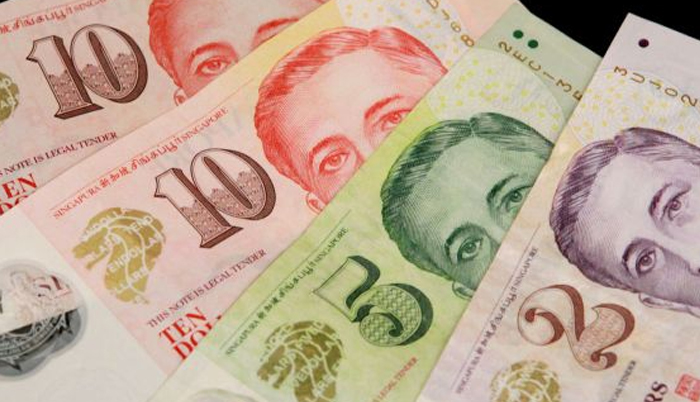![]() Home > Singapore
Home > Singapore
High Credit Card Fees, Convenience Stymie Cashless Drive

One reason why cash is still king in Singapore is because cash is easily accessible and acceptable. TODAY file photo
![]() August 22nd, 2017 | 09:23 AM |
August 22nd, 2017 | 09:23 AM | ![]() 1691 views
1691 views
SINGAPORE
High credit card fees and the convenience of cash, including easy access to numerous automated teller machines (ATMs) islandwide, are hampering the adoption of cashless payments in Singapore, consumers and industry experts told TODAY.
“Some places, like kopitiams, still do not accept cashless payments. Also, I don’t feel like I need to use credit cards for tiny amounts,” said business executive Hannah Chua, 35, who withdraws up to S$1,000 in cash from an ATM each time. “Cash is faster sometimes. The payment apps can lag or take time to process too,” she added.
Mr Chia Tek Yew, head of Financial Services Advisory at KPMG, said: “For the customers, cash is easily accessible and acceptable at all outlets. Ironically, the low crime rate in Singapore means that both users and merchants have no fear of carrying too much cash. In other countries, the risk of cash and the cost of insurance for cash in premises translates to a real cost of holding cash.”
The combined ATM network of all three local banks — DBS, UOB and OCBC — numbers more than 2,300 across the island, making even regular withdrawals of small amounts convenient for most consumers.
Mr Michael Yeo, research manager at IDC Financial Insights, noted that small businesses, especially those in the heartlands, are still reluctant to adopt cashless payments.
“Reasons for this include the high merchant fees for cards —cutting into profits — the costs of setting up the POS (point-of-sale) system and maintaining it … The lack of acceptance of cards everywhere in turn means that consumers generally need to carry some amount of cash with them at all times for day-to-day purchases,” he said.
This is in stark contrast to many cities in China, which has gone one step further, leapfrogging card payments to become the world leader in mobile payments. Pointing to China’s “fairly low” credit card penetration rates, Mr Yeo said: “Mobile payments with their lower merchant rates as well as lighter infrastructure totally jumped ahead of card payments.”
Fees for popular digital payment apps in China such as AliPay or WeChat Pay — which are linked to bank accounts — are at 1 per cent or less, often lower than those for credit card transactions. Even so, the fees for credit card transactions in China, in a range of about 0.35 to 2.5 per cent, are also often below those for Singapore, where they are between 2 and 3 per cent.
Merchants in Singapore pointed to these high transaction fees slowing the take-up of cashless payments. Mr Lim Jialiang, who owns an online chocolate shop and has a stake in a physical food and beverage outlet, said: “While there are unique circumstances for each country, I strongly think that there is a strong correlation between transaction fees and adoption of cashless payments.”
His online shop accepts bank transfer and credit card payments, while the physical shop accepts only cash. Analysts said that AliPay and WeChat Pay, which dominate the market in China, have tapped their large user bases and network of retail partners, and dangled promotions and rewards to attract users.
“Both used their existing customer bases and made ecosystem plays that enabled quick conversion of their customers to using payments. Singapore and other South-east Asian markets lack such ubiquitous players with such massive presence … Payment firms here will have to quickly expand their partnerships in order to maximise the potential venues (both physical and online) where payments can be made,” said Mr Yeo.
But banks here are not sitting back, offering a variety of new payment modes — such as by scanning QR codes — to attract small, cash-based merchants. DBS is offering this with its digital wallet DBS PayLah!.
Mr Jeremy Soo, head of DBS Consumer Banking Group (Singapore), said that more than 900 merchants have taken up its QR code-based payment system. “Building up acceptance of digital payments across retailers by highlighting their safety and efficiency, especially with smaller businesses … includes demonstrating that there are real productivity gains in adopting digital payment technology,” he said.
Meanwhile, OCBC favours a more universal QR code system leveraging Nets infrastructure.
“Our e-payments infrastructure ... has been built on an open platform that can be connected universally to banking systems to enable a common payments platform. We welcome the push for an inter-operable payments system that will simplify and unify payments for customers,” said Mr Desmond Tan, head of Group Lifestyle Financing at OCBC.
UOB, on the other hand, has been building up its contactless payment ecosystem, adding more than 4,000 POS terminals last year.
Source:
courtesy of TODAY
by TAN WEIZHEN
If you have any stories or news that you would like to share with the global online community, please feel free to share it with us by contacting us directly at [email protected]